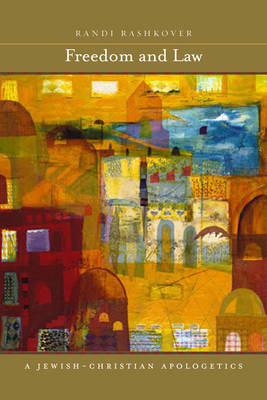
Je cadeautjes zeker op tijd in huis hebben voor de feestdagen? Kom langs in onze winkels en vind het perfecte geschenk!
- Afhalen na 1 uur in een winkel met voorraad
- Gratis thuislevering in België vanaf € 30
- Ruim aanbod met 7 miljoen producten
Je cadeautjes zeker op tijd in huis hebben voor de feestdagen? Kom langs in onze winkels en vind het perfecte geschenk!
- Afhalen na 1 uur in een winkel met voorraad
- Gratis thuislevering in België vanaf € 30
- Ruim aanbod met 7 miljoen producten
Zoeken
€ 161,45
+ 322 punten
Omschrijving
Freedom and Law offers a provocative new view of the relationship between human desire, the production of knowledge, and conceptions of power by developing a nonpolemical account of divine law. Where recent trends in political theology have insisted upon the antagonistic nature of the law, this book presents the paradigm-altering power of a discourse in the nexus between law and freedom. It demonstrates how this nexus catapults religious thought into a free and powerful engagement with nonreligious political, ethical, and social positions.
Freedom and Law challenges a contemporary wave of scholarship, including the work of Jacob Taubes, Giorgio Agamben, and Slavoj Zizek, that identifies Jewish law as the originary soucre of polemic between nations and therefore as historically responsible for the exceptionalism that undergirds contemporary conflict. By contrast, Freedom and Law argues that only in an account of revelatory law can divine freedom and human freedom be thought of without contradiction. The first part analyzes the logic of exceptionalism. In the second part, the author argues that one cannot invoke a doctrine of election without rigorous scrutiny of texts that portray an electing God and an elected people. Once we scrutinize these texts, the character of freedom and law within the divine-human relationship shows itself to be different from that found in exceptionalist logics. The third and final part examines the impact of the logic of the law on Jewish-Christian apologetics. Rather than require that one defend one's position to a nonbeliever, this logic situates all epistemological justification within the order or freedom of God. If the condition of the possibility of my claim is the reality of divine freedom, such freedom also justifies the possibility of another's claim. In a significant contribution to the post-ecclesiastical reengagement between religion, critical theory, and the political, Freedom and Law introduces new categories of knowledge and action into Jewish and Christian thinking, unbound by the dialectics of desire that has dominated the discourse of both traditions for centuries. It shows how thinking of law and freedom together may now enable Judaism and Christianity to engage in a historically self-conscious and nonrelativistic relation to each other and to nonbelievers.Specificaties
Betrokkenen
- Auteur(s):
- Uitgeverij:
Inhoud
- Aantal bladzijden:
- 344
- Taal:
- Engels
Eigenschappen
- Productcode (EAN):
- 9780823234523
- Verschijningsdatum:
- 1/09/2011
- Uitvoering:
- Hardcover
- Formaat:
- Genaaid
- Afmetingen:
- 155 mm x 231 mm
- Gewicht:
- 544 g

Alleen bij Standaard Boekhandel
+ 322 punten op je klantenkaart van Standaard Boekhandel
Beoordelingen
We publiceren alleen reviews die voldoen aan de voorwaarden voor reviews. Bekijk onze voorwaarden voor reviews.









